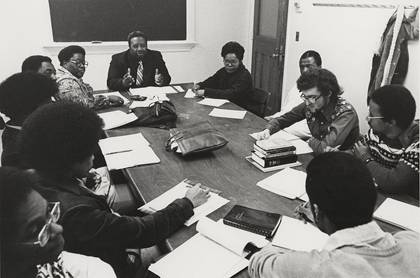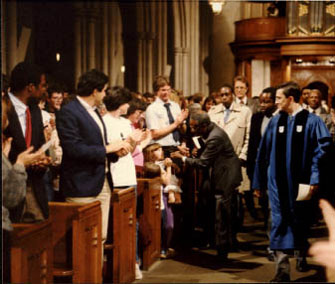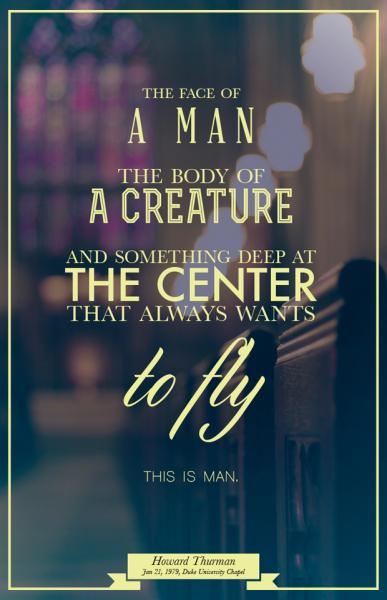The Great Black Preachers
Duke Chapel posts archive of sermons showcasing the legacy of leading ministers

As part of the university's celebration of the 50th anniversary of the integration of the undergraduate student body, Duke Chapel, in collaboration with Duke University Archives, has posted an archive of sermons from great black preachers delivered in the chapel over the years.
The archive includes prominent figures such as South African Bishop Desmond Tutu, but also other preachers such as Rev. Cynthia Hale who aren't household names, although highly praised within church circles.
Adrienne Koch, chapel communications specialist, sat down to talk with Duke Chapel Dean Rev. Luke Powery about the project for Duke Today. Links to the archive and the sermon are below. Powery said additional preachers will be added in the future.
Duke Today: Listening to these preachers, what ideas stand out to you?
Powery: For me some of the choices were impressive not just because of their preaching gifts, but these are people who made an impact on the church, on theological studies and on society. Howard Thurman, C. Eric Lincoln, Benjamin Mays -- these are key black leaders not just for the black church but for the wider academy and church through their writings and their activist mode. They have left a legacy that is broader than their preaching. In many ways, they represent what James Forbes said that "Jesus' life was the amen to the proclamation on his lips." Their impact has been not just local but global.

DT: From Peter Gomes through Cynthia Hale, do you see some common threads here?
Powery: One of the threads I think is the idea of a robust faith in God despite hardships. These sermons go back to the era of post-segregation. There is the understanding that God is present and as that being a source of hope. I also hear the importance of the human person being emphasized as Howard Thurman says in one of his sermons, "no man can be happy in heaven if they leave their brother in hell." That notion is a common thread.
One thing I enjoy is that -- from Howard Thurman to Martin Luther King Sr., from Peter Gomes to Cynthia Hale -- this archive exemplifies that black preaching is not monolithic. One can't essentialize blackness or black religion or black Christianity. There is great diversity and variety within the so-called black church preaching traditions. I think this complexifies, in a helpful way, some of our limited notions of what "black" is. Underneath this is an implicit cultural pedagogy to hear these different voices, including more and more black women voices.
DT: What is the chapel's obligation to showcase or to make available great preachers to the community?
Powery: I think that's a tremendous part of our role, as a resource not only to Duke and Durham but to the world through our various media outlets, as a place that has traditionally been considered to have one of the distinguished pulpits in the United States. In light of the dwindling resources often available in theological education, with seminaries closing down, there are fewer opportunities to hear great preaching. We are an educational resource. We want to make different voices heard, providing a rich variety, and to allow people to hear the breadth that God, through the church, has to offer. I see that happening more and more, especially in our focus on communications and making what we do accessible and known. Preaching is just one piece of that goal.
To listen to the sermons, click here.
